People Make Roofing: Jim Ziminski - PODCAST TRANSCRIPT
May 23, 2025 at 4:00 p.m.Editor's note: The following is the transcript of a live interview with Jim Ziminski, chairman of Omnia Exterior Solutions. You can read the interview below or listen to the podcast.
Intro: Welcome to People Make Roofing, a call to action led by Roofing Talent America and rooferscoffeeshop.com. We're tackling the industry's biggest challenges from outdated misconceptions to the widening skills gap. Our mission, to show the next generation the true potential of roofing, including the diverse opportunities, endless growth possibilities and a chance to make a lasting impact. Join us as we share unfiltered stories from the industry professionals across North America, inspiring and guiding the future of roofing.
Luke McCormack: Hi everybody, this is People Make Roofing and I am Luke McCormack, your co-host of Roofing Talent America.
Heidi J. Ellsworth: And hello, I'm Heidi Ellsworth with RoofersCoffeeShop, your co-host for People Make Roofing. We are so excited to be here today with this podcast and we are so proud to have Jim Ziminski on the call today. Jim, welcome.
Jim Ziminski: Thank you. It's great to be here. Really great to be here.
Heidi J. Ellsworth: We would love for you to tell your roofing story, it's so inspirational.
Luke McCormack: And I've actually not heard it, but I've heard great things, Jim, so take it away.
Jim Ziminski: Yeah, so my name's Jim Ziminski and I've been in this industry since 1985, when I got out of college. So, fell into the industry by accident and here I am 40 years later as a senior statesman, if you will. I actually started off in windows for the first 12 years working for window manufacturers. So I would go around the northeast and train dealers, home improvement dealers, how to generate leads, how to sell in the home, how to run their business more efficiently and make money and loved it, loved it. It was a great indoctrination, even did some in-home selling. And then I switched over to siding, joined CertainTeed Corporation and then ultimately Crane and became president of Crane Siding. And we innovated products like Crane board and other products that revolutionized that siding business. And again, calling on home improvement dealers and calling on distributors and always in a different manner, teaching them how to make more profits, how to be more successful.
So I was always fascinated by that side. We ended up selling that business, Heidi, in 2008. And then ultimately, I rejoined the Cranes to run a roofing business called Able Roof and Mr. Roof. And for me, what was exciting about that was I started off as a manufacturer. So I would teach a lot of dealers and a lot of distributors and now I actually got to be a contractor calling on the ultimate consumer, the person who uses the product. To me that was fascinating. And I know a lot of guys that started manufacturing, they look at that as the pinnacle. And it is in some ways, but I felt like dealing with the consumer direct was different. So I came into this industry a little bit different. I knew the business side of it well, the marketing, the sales, the windows, what have you. And then I got into roofing later and man, I wish I would've gotten in sooner.
It's a phenomenal business and I'll share with you why I say that. But that's been my journey and I've loved every year of it. Now, I am chairman of the board for Omnia Exterior Solutions and we are acquiring roofing businesses around the country and we are putting them together to create a larger platform. And I also have a partnership with a gentleman and we do all the acquisitions. So it's pretty cool and I'll tell you how we do it and why. But my 40-year background has made me really, I don't know, passionate about it. I want owners of businesses to make really good decisions because quite frankly, I had some friends who are owners and they didn't make maybe great decisions and now they're regretful. They got a lot of money, but they're not real happy. And so, my mission is to try to help people make good decisions.
Luke McCormack: That's really interesting, Jim. And particularly, particularly the acquisition side because particularly in roofing contracted 49.2% of American roofing business owners, baby boomers, four years out, have been near retirement age, lots don't have succession plans, they don't have exit plans in place. And obviously, a fairly fragmented baby boomer market is ideal for you for acquisitions. Keen to hear a bit more about that, Jim. What type of companies are you targeting? What success stories do you have?
Jim Ziminski: Yeah, it's been amazing. I'll tell you how it started. A little over two years ago, I met my partner Mike Blumenfeld at the Best Success Show. And I was doing a seminar speaking about successful ways to sell and market your business. And my angle was different than the norm because, again, I wasn't like, "Hey, go find all the money." It was like, "Go find the right fit. And before you enter to this process, you have to answer the hardest question for every roofer and every..." Honestly, it's usually males that have a harder time than females. What do you want to do with the rest of your life? Do you want to retire? Do you want to stay active? Do you want to lead a bigger business? What's the next 10, 20 years look like? And to me, that's the question. Once you answer that, the process of potentially marketing your business becomes easier because you know your desired outcome.
If you don't know it, you can make a bad decision. And so what I did, I looked at the industry and I was like... Coming from windows, this is a little secret from back in the day, we used to make fun of the roofing guys. And the reason we did was they were the big rough and tumble guys. The window guys were the really good slick sales guys. We'd go to a distributor show and we'd set up booths. And who do you think by the end of the night always got in fights? It wasn't the window guys, it was the roofers and it was with each other, they were the big tough guys. And so we would laugh about it, but true. What was interesting was when I got into roofing, what I saw was this professionalism beginning to change in the last 10 years or so, where more professional sales organizations got into the roofing space, which was really quite fascinating.
So, as I looked at this before we launched this company, I went out and listened to the market. What I heard was my friends who were manufacturers didn't love the consolidation. My friends who were distributors and were my customers when I was in manufacturing and I was their customer when I was a roofer. I know all these guys from many, many years in the industry, they weren't happy. And the reason they weren't happy in general, I'm generalizing, is some of their best customers were being acquired. The owners were going off into the sunset with millions of dollars and the people who backed built the business were like, "What about us? What do we get?" And so they were leaving and sometimes starting other businesses and then these distributors and manufacturers are like, "Wait a minute, my best customers are going backwards after being acquired, not forward."
The other phenomenon that was occurring was six, eight companies were being bought and put together. And what do you think PE groups do? Well, they just go to the distributor and manufacturer and try to leverage a better price and many in not a very user-friendly manner. And having been an innovative manufacturer for years, I know the best customers I had, I considered partners, right? We worked together for mutually beneficial solutions and they tended to get the best deal and the best treatment. The guys who just leveraged me, maybe short term they got a deal, but long term they didn't. And so my philosophy was a couple of things. Number one, let's make sure we partner with the manufacturers and distributors, not the adversarial, because I felt like they could be an asset to me if we did it a different way. And number two, let's find the subset of roofers out there who are what I would call one word above all others. And that's curious.
If I got 10 of these guys or gals in a room, they were curious to learn from one another because they didn't have the big egos. A lot of people that have built businesses tend to have pretty big egos and you get them in a room and all they want to do is tell you how great they are and they don't want to learn anything, right? You can't learn in that situation. So we felt like if we can find the group of individuals who are curious, who are employee centric, who want their employees to succeed, we then talk and work with the distributors and manufacturers and say, "Look, this is our model. This is how we're going to do it and watch what we do." And the thing that makes me most proud is we're two years into it, we're over 300 million now and we have 11 partners. And the distributors and manufacturers come back to me and they're like, "You told us what you were going to do and by God you've done it."
And we have a lot of work to do still, by the way. We were not perfect. We got a lot of work to do, but we built it differently. I became the chairman of the board, the private equity company, our partner CCMP, who incidentally I met 15 years earlier through siding. And so, we've been friends for 15 years. So, it was unusual that I had a personal relationship and a trust with our partner. When my partner and I interviewed a dozen private equity firms to select the right one that would believe in the model that I wanted, these guys rose to the top immediately. It was obvious they were the ones and it's been awesome. And what I like to tell business owners is, "Look, it is possible to have a successful sale of your business and partner with people you like and have fun in the process."
You just have to work really hard to find that partnership and be honest about what you want. And we're not for everyone, that's okay, but we're very transparent. This is our model, this is what we do, how we do it. If it works for you, awesome. If it doesn't, let me help you find the right partner because you're only going to do this one time. And God, I know how hard you work to get here, so don't make a mistake. So that's loosely what we're trying to do and it's been a heck of a fun ride and we got a long way to go yet.
Luke McCormack: You said that you're just getting started, Jim,
Jim Ziminski: Just getting started. That's right. You guys have seen SRS, obviously, in what they've got in distribution, right? We're going to do something similar in contracting. So, we're going to acquire these folks who are partners. Every single person we acquire puts 25% or more. The proceeds back in the shares of ownership of Omnia, the same shares I own, the same shares private equity. We don't have different classes. Everybody owns the same shares, which we think is important. And then we give performance shares out to the owner to give out to their key employees. So they are owners as well. We have over 200 owners at our businesses right now at Omnia stock, which is awesome. So we will have a transaction in a few years where we sell to a larger private equity group and we tell them that upfront, you're going to make a bunch of money on that, but that's not the end.
The end would be just, "Okay, we're done. We made money, great." No, we're going to continue on like SRS did three times and then ultimately, sold the Home Depot. And many, many people made millions of dollars and had fun in the process. And again, if you are very methodical and thought out, that is possible. So we built a leadership team with a professional CEO that we recruited. We built a team with a professional CFO who's done this before that my partner knew and a professional HR person. So, we have the team that the next group will look at and say, "This is wonderful. Can you get bigger? You're, whatever, 500 million can go to 2 billion." And we'll say, "Yeah, we built it that way because we didn't want to just do this one time."
And so, everyone knows that. And that's the other reason that I didn't want to be CEO, is I know what it takes. It takes a lot of time and work and effort. And I was telling Luke, I have 11-year-old twin daughters that I took to see Taylor Swift. I want to spend time with them. So, this to me is a perfect fit. I get to bring the right people in. I get to vet the people that maybe aren't right for us and help them go to where they are. And then I get to stay involved as chairman of the board.
Luke McCormack: It's a very interesting offer, Jim, because if you're saying upfront to keep 25% in the deal and that's going to sell and sell and sell. I would imagine for most owners, that 25% will compound over to much more than 75%. And a lot of platforms wouldn't allow a company to keep 25% in so they can keep more for themselves. So, I think that says a lot about the sort of values that you've got behind that, Jim. I think that's great. For anyone who's listening, Jim, who they may be looking at the next few years, they don't have a succession plan or an exit plan. What type of companies are you looking to partner with?
Jim Ziminski: Everybody's got their own model and that's again, why it's important to understand what that model is. And I tell everyone, there's two things you should really do. One, is talk to your trusted distributor and manufacturer friends. You know why? They know every platform out there. They know the good, the bad and the ugly. So talk to them and in an unbiased way, they'll tell you what they hear. Number two, ask the private equity firm who have you acquired and get a list of everyone and call everyone. A lot of guys, they'll give you the three that are real happy, not the 10 that maybe aren't. We give everyone and say, "Call them," and we're not on the call. Talk to them one-on-one, find out how it's going. So really, really important that they do that. In our model, Luke, what we're trying to do is we want to be mostly residential, okay?
We want to be a nice mix. So some companies only want retail, some only want insurance, some only want storm. We want a mixture of those. So we want to be a roughly 50% retail, 50% storm/insurance. So, we have a bunch of really great retailers in our group. We have some guys who I would call more insurance related. They'll work a wind event for two years after the event. And then we have one company that I knew these guys for 10 years personally, they're stormers. They chase storms. And so, what's beautiful about them is there's always a storm somewhere. And if there's a storm in our network, guess what? We can capture more of it because we have this storm guy within our network and they're trusted and we all own the same share. Instead of maybe doing a million dollars off a storm as a local roofer, why wouldn't you want to do 5 million by partnering with our partner? So that's our mix. We have a little bit of commercial in there, maybe 10%, but that's about it.
Heidi J. Ellsworth: That's brilliant. That's really smart.
Luke McCormack: Yes, very smart. Jim, this is a completely different question from the question list, but I'm always very intrigued when I'm someone like you, you're looking at the industry holistically, you're looking at gaps and you're looking for a win-win situation to grow. So when you look at the market, the number one question I can never truly get the answer to is, how many companies are there in roofing in terms of proper function, not a truck in a truck, maybe above a million, but how many are out there? How many are out there who are trying to be acquired and have not yet been touched?
Jim Ziminski: Well, it depends. You had asked the question earlier, Luke and I realized I didn't quite answer it. In our model, not only those types, but we typically want a company that's doing at least 20 million in revenue to about a hundred million. That seems to be our sweet spot. So you start looking at companies like that and the pool gets much smaller. I've heard 50 to 60,000 roofers in the market and I've heard things like 95% of those or a million or less. So, you start taking out the small guys. And by the way, there's nothing wrong with them. There's a lot of great small guys that have great lifestyle businesses. We're looking for businesses. Our model is fine businesses that are growing. We don't buy fixer uppers. Some companies do and they just consolidate and cut expenses. That's not our model. So, everyone's got a different model.
But once you start looking at a big market, pick any big city in the country or any metro, you say, "Oh my god, there's hundreds of roofers." Well, you start taking it down to the guys in our size range and all of a sudden there's two, there's four, there's maybe five, there's six. It's not an unlimited pool. And then you start saying, "Oh, wait a minute, now I got to find the folks that are curious, that are not big egos and that want to work together." And then it narrows it down. So my partner always likes to say, "I don't always know exactly what I'm looking for, but I know when I see it." And we do, we talk with them and we can tell right away if it's a fit. If a guy just keeps asking about money, money, money and it's just about what's my multiple, he's probably not a good fit for us.
We want someone that wants to stay engaged, that wants to reinvest, that understands that they'll make more on those reinvestments. But we also want good people, because... And Luke, I kid around with our guys and I hope it's okay to maybe swear just a little bit on this podcast, but I tell guys, "You know what, when you're young and you're building your career, you got to work with assholes sometimes because that's what it requires." But when you're older and you've done it for a while, you don't have to and you don't want to. And that's our mantra, is we don't want to work with any of those folks. We want really good people that want to be a part of this and want to work together. So if a guy in Maine is having a problem, our guy in South Dakota says, "Hey, why don't I fly up there for a week or two and help you out? Or why don't you send your team out here for a week and I'll train them and show them what we're doing?"
And that spirit, that mentality, I can't force that on somebody. But if they're curious, if they're not egocentric, guess what? They want to help one another. And we all, again, own the same shares and we all know what the plan is. And so, I think that's where it starts with. It was interesting talking to investment people up front and some of the lenders because, obviously, you have people behind you as well.
And I would tell them about the curious and non-egocentric. And you could tell they're like, "Yeah, that's a bunch of BS." And by the end of the conversation, they're leaning in and they're going, "Man, this is unique." Because they would ask a question like, "What's your relationship with your subcontractors?" Because everyone uses 1099 to do the labor, almost everyone. And I said, "Well, let me ask you a question. If I have someone who's curious, who cares about employees, who cares about the future of their business, don't you think it's going to be a better relationship with those subcontractors than the big ego guy who's just barking orders all the time?" So that's why we have such a great subcontractor base because we treat them as they should be treated with respect and dignity and they're valuable.
Heidi J. Ellsworth: Jim, I know a lot of the companies that are part of Omnia and I am long-term friends with many of them and who I think are just absolutely amazing men and women. As you're growing Omnia and you're really working with all these owners, what are some of the things that you're doing to help bring up that next generation? Because you had talked about that before, that you don't want to leave all the employees behind, right? They're just riding off in the sunset with all the money. What are you doing to build that future leaders and that future generation?
Jim Ziminski: I'll tell you what's been the most surprising, Heidi, two years into this and that is I thought most of the folks we would acquire would be 55 and up that are looking to exit. And I would tell you the probably average age of the company owner we've acquired is 42. We've got all these young people because they buy into and understand our vision. And they don't want to just sell and cash out, they want to stay engaged and do something more. So, five of our folks who we've acquired are working at the Omnia level now and they've promoted people within their business to run their local business. And so, I think to answer your question, we are very technology forward. This industry, the biggest change in the last 10 years is you go to these events, you don't see massive innovation and product.
You see some. All the innovation is around technology and all the things that support roofing, right? And so, those tends to be younger people that embrace that and embrace change. And so, we encourage that within the group. And so we have, I think out of our marketing group, all but maybe one of the people came from member companies and they're all either female or younger that wanted to do these things because we feel like we need to lean into the future of the industry, not out of. I mean, a number of our owners are in their 30s that have joined the business. And so, others see that. They always say, "I want to see someone like me working for the business." And so, they see people like them and they see that those people are advancing within the organization. And we don't look at it and say, "Oh, Jim, you've been doing this 40 years, you know everything."
Because let me tell you, there's a lot of people in the industry and I know one of your questions is like, what do you recommend to young people? And the first thing I'd recommend is, look, after 10 years, don't have ten one year experiences. Make sure you have 10 years of experience and you're continually learning and building. And so we try to create an environment that fosters that learning and building. We have a legacy builder meeting quarterly where the original owners come and we talk strategy and we talk about that. And that's one of the things we talk greatly about. We are going out to one of our members in early April and he's training all of our sales group on how he sells because he's been so successful. And so, those are the younger folks that are going out there to train, not the owners, the younger folks. And so, you got to lean into it and you got to allow their ideas and not be like, "I know everything. I'm the guy that ran the business."
Heidi J. Ellsworth: That's what we find too. Exactly, the same thing.
Luke McCormack: We have the exact same. We've got a very young workforce and it's absolutely fantastic. I think it's important to have the mix of both, so you've got the wisdom and the raw energy coming through. But I think that's the main thing about roofing, which is the biggest secret that if you're young coming into this industry, you can very quickly move up the career ladder, partner with private equity, get a sale in, join essentially a peer group of teammates that are on the same mission as you. Jim, obviously recruitment is what I do. So we speak to candidates day in, day out as well as business owners. And when people look at the market now, it's not like 10 years ago where you wanted an estimator of 10 lining up. There's been a paradigm shift. Now, you've got 10 people competing for the same estimator.
And what I'm hearing in the industry a lot is it's no longer about winning projects or getting the right margin, it's all about the people. And we've got this dwindling candidate pool, so much competition and the competition aren't companies that just want to get by. These are companies that want to take over, get to the top. So, how important is it to really invest into developing your people in order to retain them? And for the benefit of other business owners listening, Jim, what type of things do you do to make sure that your people are growing personally and professionally?
Jim Ziminski: Yep, yep. Well, there's a lot. I mean, first of all, one of the things we do is any employee at a business can buy Omnia stock. So, even if you're a young employee with as little as $20,000, you can own some shares in Omnia. And we encourage that. So they feel like owners early on and they're building wealth. They're building a career, right? Working hard and making money, but put some money that can create wealth and we have that ability. Now you think about these younger folks, the ability to train and recruit at 300, 400, 500 million is not the same as a local company doing 10 million. It's just not. You have greater resources and you need to leverage those. And so, that person that's in Montana where we have a business, which is a pretty rural marketplace, it's a great business. They're not going to get the same educational training opportunities in Montana that they do in this bigger group where we have guys all over the country and gals all over the country.
And so, we really lean into that. And we encourage them to communicate with one another one-on-one. Not just formally through us, we make sure they have others contacts. So if they're in operations and they're having a hard time with production on whatever issue, reach out to a peer who's, by the way, also an owner in the same shares you are. And now, they're going to lean in and help you. And I just love seeing that kind of stuff. It really is awesome when you see. And I hear through the grapevine that those folks got together on their own. That's where the magic occurs, right?
And we, obviously, set up things like that training. We hired a full-time sales recruiter for Omnia. That's how important we think sales is. So we have a full-time recruiter. Now, are they going to recruit all over the country? That's hard, but they teach people locally what it means to recruit and how to recruit and how to bring folks into the industry. And I would tell you, most of our successful people, certainly in sales come from outside the industry. And we look for the things that I can't teach. That would be work ethic, that would be personability. Like someone, you want to be around them. And do they have some intelligence? It's hard to teach those things. If they come in with those things, man, they can be very successful in our organization.
Luke McCormack: Recruit on personality, trade on skill. I think really, Jim, it's a necessity in our industry. You don't want the guy that takes on me a hat off one day, puts the next hat on. And when you look at the future of the industry and growing the next generation, it's not down to the NRC or the Alliance or universities, it's all of us. We're all benefiting so we all need to put back in. I think that's amazing. On the private equity front, Jim, so people will see private equity coming in and they think, "Oh, this is not good. This is cutthroat, this is corporate, this is bad for my business." What will happen to my second-tier management? But then other people think this is just what the industry needs. It's professionalized in the industry, it's putting in processes, systems to correct second-tier management.
How do you think private equity will shape the future of roofing? Are we going to be 10 years down the line where 60% of the industry are all big sectors and the rest are just local players? Or will it be when new platforms start, people leave them, start their own? There's a lot of uncertainty, a lot of technological advancement and a lot of competition for people. So, I'd be keen to hear what your prediction is 10 years down the line. And then also, when will private equity leave? Obviously, [inaudible 00:28:29] HVAC rolled up left, how long do you think this will last and what's the outcome?
Jim Ziminski: Yeah. Well, man, that's a deep question. It's just like I tell guys, you're in a marketplace, a big city and there's a bunch of roofers. Are they all good ethical businesses? No, there's good ones, there's bad one, there's everything. Same thing with private equity. There's great private equity companies that are wonderful people, but there's also a lot of cutthroat, ruthless ones that don't care. They just want to make a buck and get out of the business. And the difference is they're all really smart people. They went to the best universities and they are smart. And sometimes they feel like, "Oh, I can get over on this roof or what does he know or what does she know," right? And so, that's where you've got to be cautious. So to answer your question, I hear people say all the time, we're in the first inning, we're in the second inning of this roll up in private equity.
The reason I have this gray beard, but I shaved this morning so I can't say that right now. But what I had the luxury of is I saw the consolidation of the manufacturing industry. I was in vinyl siding, there were 19 manufacturers. When I left, there was five. And so I saw it in windows, I saw it roofing, same consolidation. Then guess where it went next? Distribution. I had hundreds of customers as distributors and each year they were getting acquired and there was fewer. And what I would tell you is if you look at the distribution industry as an example, there's three big ones right now, that dominate. There's more than that, but three big [inaudible 00:30:06], ABC, Beacon and SRS. And by the way, Beacon, who knows? They may be something different shortly, but is their service better than it was 10 years ago?
Yeah, it's better. Do they have more product availability? Are they better trained? Yeah. So there's going to be winners like there were in those three and there's going to be some that don't do as well that just make a quick buck and flip. And when you're fixing up houses and flipping them, everybody makes money when the market's hot. When the market slows down, people get left holding the bag and who survives? The good well run ones. And so, what I believe you will see is in the next five years, you'll have at least five companies over a billion dollars doing residential and commercial roofing, at least, if not more. And what they will do is begin to professionalize the industry more rapidly, right? More technology, more leverage with distributors and manufacturers. We use the leverage not to say, "I want a better deal." We use it to say, "Hey, we're all over. Can we get more training from you? Can you host us at our [inaudible 00:31:13]?"
Every time we have a legacy builders meeting with all of our people, it's hosted by a manufacturer or a distributor. Why? Because they have awesome facilities, they have access to our entire team to tell them about the products and we're partnering with them versus being, again, adversarial. So, I believe you're going to see winners and losers. I've heard as many from my distributor friends that they're tracking private equity, that there's as many as 76 roll-ups occurring in the industry right now and they're all varied, but there's probably 10 right now that you hear a lot about. I'm proud to say, we're one of those. And I was really proud when our private equity partner was at IBS a few weeks ago and a few folks... I can't mention names that are high up in the industry said, "Hey, we've been watching what you guys are doing with your roofing platform and it's really impressive."
And that warms my heart because we want to do it what I call the right way. Again, I don't want to imply people are doing other things the wrong way. We just think our way is the way we want to do it and so we're very transparent about that. And so I think what you're going to see, Luke, is a whole bunch of winners that get big. The little smaller guys won't go away. They'll just have to be a lot better to stay in business. Just like there's local distributors, they're still local distributors, but they can't meet the leverage of those big folks, so they've got to be really good at relationships, really good at service. They've got to have something that's unique. And the fight to generate leads because it's always been... The thing I learned from day one back in '85 was this is a lead business.
This is an opportunity, you've got to create leads consistently and cost-effectively. And when you're bigger, it becomes more efficient to do that. You've got to train your sales group to convert those leads properly to the right product at the right price for you to make a profit. If you close every sale, you're selling too cheap, it's not good. Conversely, if you close one in a hundred, you're not very good, you need to be in a certain sweet spot. And then, you need to deliver on the promise those first two things made, right? Because sales and marketing are making promises to the consumer, you better have a really well-run operation to deliver on those to get that repeat business and keep the flywheel going. And so, that's what I believe you're going to see. And I think in another year or two, some of the big private equity groups that are successful that built will start to acquire some of the small ones and you'll see roll-ups in that front.
We have not wanted to do that because of the culture piece, but when we sell to a bigger one, they're only buying you for one reason and that's to make money to get bigger, to do you more successful. And so at some point that'll transpire, it's why we have this real urgency to build our platform, to have a centralized CRM, to have centralized HR, to have centralized ERP, to have a true leadership team, to have a real board, to bring the right people in so that in a year, two years, three years, when we turn, we're already set up and we just keep rolling like SRS did in distribution, right? No one even knew they were acquired half the time and they just kept rolling with the same leadership.
Luke McCormack: Yeah. I think that centralized operating system, Jim, is so important because you'll have seen the other large companies who have it decentralized and the problems that brings. What interests me, Jim, is you've done 11 acquisitions so far, which tells me you've looked at hundreds of business, you've dissected their financials, their operations, their hearts and minds. For the benefit of the audience, what is the most common problems with roofing contracting firms that you see in the market right now and how do they fix it if you've got time for the solution? What is the main problems that we see?
Jim Ziminski: I would say, the main problems are they don't have good processes and systems. They were built through guts and hard work. And that'll only get you so far. You've got to eventually develop really good systems and processes so you understand your metrics so you can improve upon those. And by the way, I was as guilty as anyone. I was always, "I don't need all those process systems." And you do, if you want to be able to successfully scale your business. You can get to 5, 10 million without them maybe, but you can't get to 20 and 30 and 40. Management by heroics won't last long. We've all tried it, we've all been there. You've got to get processes and systems. I would say, that's the number one thing that's been impressive to me with some of the folks we've acquired and some young folks in their 30s that are like "Damn."
And I look at them and I go, they were better at this than I was and I was running a $200 million business in roofing. And that's what I would say. And to do that, you've got to let go as the owner. When someone maybe younger that's really good, has an idea, you got to give them some space. You got to give them some room and let them try it. Obviously, not enough that they hang themselves and make a tragic mistake, but that's hard for some business owners to do. That's what I would say, we see more than anything is they just don't really know their numbers. They think they're way more profitable than they are and they're not. I know when I first started this and I was doing my seminars, I did research and they said, "The number one reason a business doesn't sell is the owner feels it's worth a lot more than the market does." And my wife's in real estate and I see the same thing in housing, right? Someone thinks their house is worth a million bucks and the market thinks, it's worth 750.
Heidi J. Ellsworth: Jim and Luke, I was going to say, this has been so amazing. We are actually a little bit over because this is just so good. I love it so much. But I have one question that I wanted to make sure that we got on there and it is so important around People Make Roofing and that is, Jim, what is your advice to young people who want to get into roofing? How can [inaudible 00:37:36] young people get into roofing and what are your nuggets?
Jim Ziminski: Well, someone told me this morning at the coffee shop, show me your friends and I'll show you your future. And I think that is accurate. And so my number one advice is find someone you admire in the industry that you think has built a good business or career and let them become a mentor to you and become friendly with them. I mean, I've been a big brother twice in my life now, I'm a big brother to a young man right now. The older gentleman who I met in 5th grade is now 32 and he runs his own home improvement business. I'm so proud of him. He just started. So find somebody that you respect and can trust and have them help you. And embrace change, because, guess what, it's happening whether you like it or not. And that was a success for me early in my career was I learned to love change because it was going to happen.
And so I always stayed at the forefront and ultimately, this what we call the Blue Ocean Strategy, finding a new market, has worked dividends for me again and again in my career. And I would say, it has in this roll up with Omnia Exterior Solutions is what's not being played and there's always an open spot. And so try to innovate, try to be different, take chances and find that good person. Don't go to a mentor that you don't want to be like. Find someone that you like and respect and have fun for God's sakes. Do this a lot, have fun. Yeah.
Heidi J. Ellsworth: I love it. Well, I look up to you, Jim. Thank you for all you do for the industry and for everything. That's awesome.
Luke McCormack: That is. It's interesting, the business partner that you started acquiring businesses with, Jim, you met at Best of Success. And these mentors, these partners for young people that want to get into the industry, go to IRE know, go to one of the regional roofing meetings. Because this industry, honestly, Jim, it has changed my life. And is people that have given me a leg up, that have put their arm around me, that have helped me. I done a newspaper article years ago and it was what was your advice to young people? And it was be inquisitive. Get yourself a mentor. People want to help. So, if you're listening and you want to get into roofing, reach out to someone from the industry. The majority are good people, they will help you. And if you're in residential roofing and you want to join a platform, then Jim's your man.
Jim Ziminski: I mean, I would love to chat with you. And my commitment is 100% honesty and integrity and I will help you as much as I can. If we're a great fit, wonderful. If we're not, by the way, there's plenty of people who are. And it may not even be the right fit. I might tell you, keep running this thing another five years, 10 years and so happy to help anyone that wants to reach out.
Heidi J. Ellsworth: That's the kind of stuff you need to hear. Well, thank you. Jim, thank you so much. And Luke, as always, this is just amazing, what a great People Make Roofing podcast.
Luke McCormack: Amazing. Well, Heidi, thank you for inviting Jim on and Jim, thank you for coming. And stay tuned for the next People Meet Roofing, available on Roofing Talent America YouTube, RoofersCoffeeShops YouTube, LinkedIn, everywhere you get your podcasts, that's where we are. Thank you, Jim.
Jim Ziminski: Thanks for having me.
Heidi J. Ellsworth: Thank you, Jim. Be sure to check us out on all of your podcast channels. We'll be seeing you next time on People Make Roofing.
Outro: Thanks for listening to People Make Roofing Together with Roofing Talent America and rooferscoffeeshop.com, we hope to shape the future of our industry. Share this episode and keep the conversation going because people truly make roofing.
Recommended For You
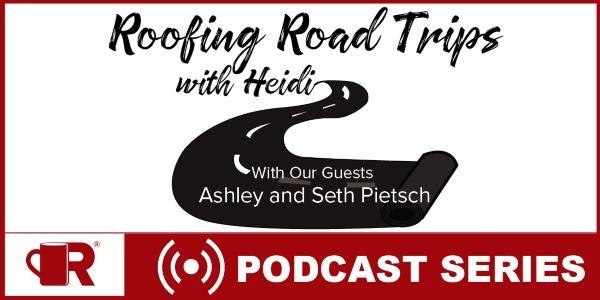
Roofing Road Trips with Heidi- Insurance in the New Normal PODCAST TRANSCRIPTION
Read More ...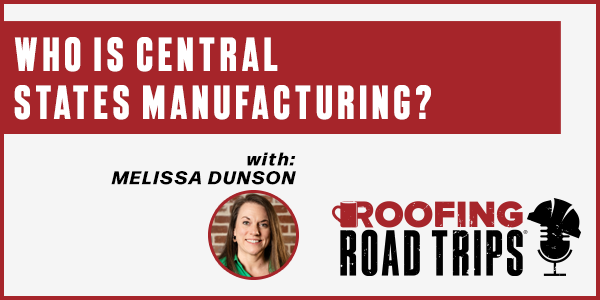
Melissa Dunson – Who is Central States Manufacturing? - PODCAST TRANSCRIPT
Read More ...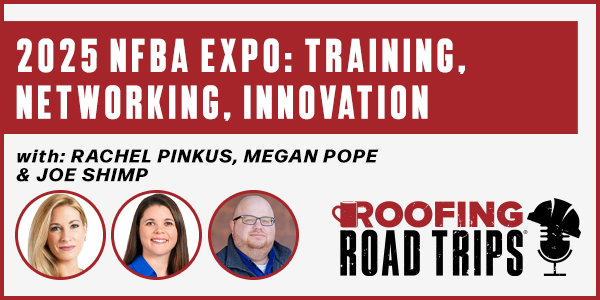
Rachel Pinkus, Megan Pope & Joe Shimp - 2025 NFBA Expo: Training, Networking, Innovation - PODCAST TRANSCRIPT
Read More ...


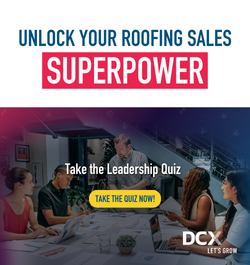









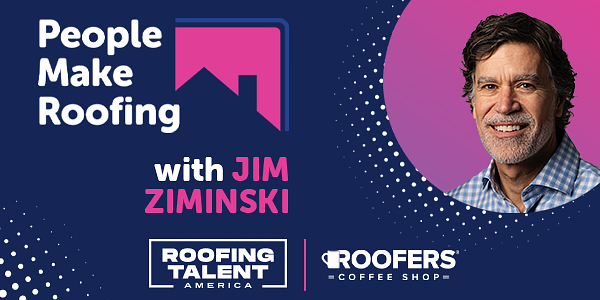



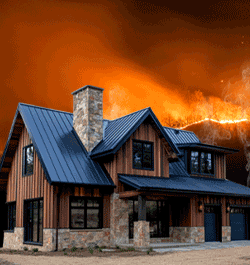

Comments
Leave a Reply
Have an account? Login to leave a comment!
Sign In